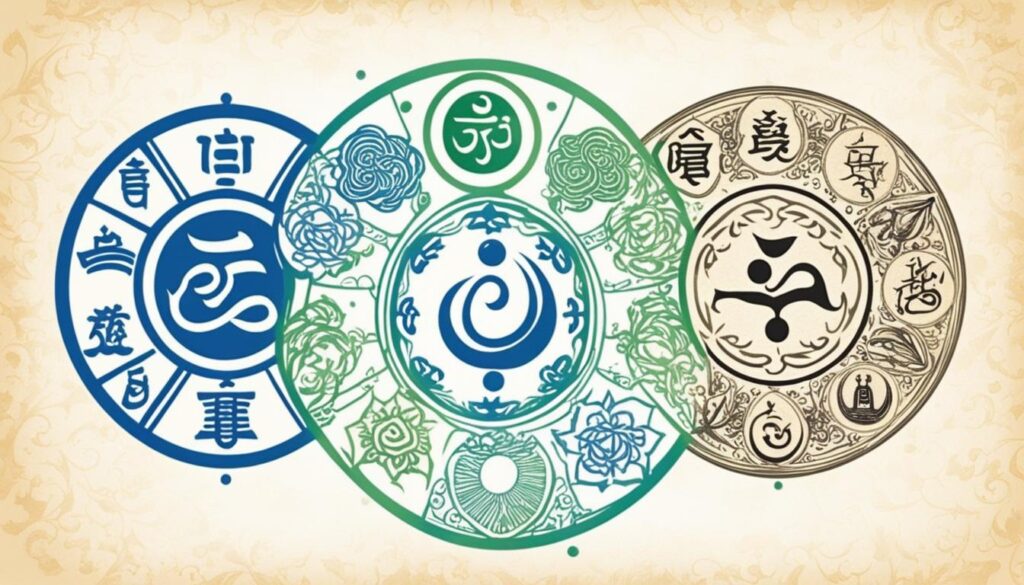Are you searching for spiritual guidance? Wondering which path can lead you to a more fulfilled and enlightened life? Confucianism and Buddhism, two ancient belief systems with profound wisdom, offer unique approaches to alleviating human suffering. But which one resonates with you?
Confucianism, founded by the revered philosopher Confucius, places a strong emphasis on ethical principles and the way of life. Buddhism, on the other hand, was founded by Siddhartha Gautama (the Buddha) and focuses on the Four Noble Truths and the Eightfold Path to overcome suffering. Both these traditions have shaped the beliefs and practices of millions of people across the world.
In this article, we will delve deep into the beliefs, practices, and values of Confucianism and Buddhism. By exploring their teachings and philosophies, you will gain a better understanding of the differences and similarities between these two spiritual paths. But ultimately, the question remains: Which path will you choose to embark on your own spiritual journey?
Key Takeaways
- Confucianism and Buddhism offer different approaches to spiritual enlightenment and the alleviation of suffering.
- Confucianism emphasizes ethical principles, societal harmony, and the way of life.
- Buddhism focuses on the Four Noble Truths, the Eightfold Path, and personal enlightenment.
- Confucianism places importance on filial piety, loyalty, and respect for authority figures.
- Buddhism believes in the concepts of karma, rebirth, and the interdependence of all beings.
The Beliefs of Confucianism and Buddhism
Confucianism and Buddhism have distinct beliefs that shape their respective philosophies and practices. In Confucianism, the fundamental beliefs revolve around the importance of filial piety, loyalty, and respect for authority figures. It upholds the values of harmonious relationships within society, emphasizing the significance of maintaining proper social roles and responsibilities.
Buddhism, on the other hand, is founded on the Four Noble Truths, which are central to its belief system. These truths state that life is suffering, suffering is caused by ignorance, suffering can be overcome, and there is a path (the Eightfold Path) to overcome suffering. Additionally, Buddhism incorporates the concepts of karma (the law of cause and effect) and rebirth, where one’s actions in previous lives determine their current and future existences.

These divergent beliefs reflect the core principles of Confucianism and Buddhism, guiding their respective followers and shaping their spiritual journeys. While Confucianism focuses on social order and ethical conduct, Buddhism provides a profound understanding of suffering and offers a path towards enlightenment and liberation.
The Practices of Confucianism and Buddhism
Both Confucianism and Buddhism offer unique practices that guide their followers on their spiritual journeys. Let’s explore the practices of each belief system and discover how they differ.
Confucianism Practices
In Confucianism, rituals play a crucial role in daily life. These rituals involve various aspects, including ancestor worship and adherence to traditional customs. Ancestor worship is a way to honor and respect one’s deceased ancestors, seeking their guidance and blessings. Confucian followers believe that maintaining a strong connection with their ancestors fosters a sense of continuity and strengthens familial bonds.
Alongside rituals, Confucianism places great emphasis on self-cultivation and personal growth. Followers of Confucius believe in constantly striving to improve oneself morally and intellectually. This pursuit of knowledge and self-improvement is considered essential for cultivating a virtuous character and contributing positively to society.
Buddhism Practices
Buddhism, on the other hand, emphasizes meditation, mindfulness, and compassionate action. Meditation is a practice that enables individuals to quiet the mind and cultivate a deeper understanding of themselves and the nature of reality. Through regular meditation practice, Buddhists seek to develop inner clarity, peace, and insight.
Mindfulness is another important practice in Buddhism. It involves being fully present in the moment, observing thoughts, emotions, and sensations without judgment. By practicing mindfulness, Buddhists aim to cultivate awareness and break free from the cycles of suffering caused by attachment and aversion.
Additionally, taking refuge in the Three Jewels (the Buddha, the Dharma, and the Sangha) is a fundamental practice in Buddhism. This act signifies a commitment to following the teachings of the Buddha, seeking guidance from the Dharma (the Buddha’s teachings), and finding support within the community of practitioners, known as the Sangha.
Furthermore, Buddhist rituals such as chanting and prostrations are performed to express reverence and devotion to the Buddha and to generate positive energy.

With their distinct practices, both Confucianism and Buddhism provide pathways for individuals to cultivate ethical values, spiritual growth, and self-awareness. These practices enable followers to deepen their understanding of themselves, the world, and their place within it.
A Comparison of Confucianism and Buddhism
Confucianism and Buddhism offer distinct approaches to spirituality, providing individuals with different paths to enlightenment and the alleviation of suffering. While Confucianism centers around the idea of societal harmony and ethical conduct, Buddhism places a stronger emphasis on personal enlightenment and liberation from suffering.
Confucianism, rooted in the teachings of Confucius, places great importance on maintaining harmonious relationships within society. Its principles revolve around filial piety, loyalty, and respect for authority figures. Confucianism values social order and adherence to traditional customs, highlighting the significance of maintaining balance and harmony in all aspects of life.
On the other hand, Buddhism, founded by Siddhartha Gautama (the Buddha), focuses on the individual’s path to liberation from suffering. Buddhist beliefs encompass the Four Noble Truths, which state that life is suffering, suffering is caused by ignorance, suffering can be overcome, and there is a path to overcome suffering. Buddhism promotes the practice of meditation, mindfulness, and the cultivation of compassion.

Confucianism and Buddhism also differ in their emphasis on societal relationships and personal detachment from worldly desires. Confucianism places a strong emphasis on social and familial relationships, promoting the idea of filial piety, respect for elders, and the overall harmony of society. On the other hand, Buddhism emphasizes individual liberation and detachment from worldly attachments. It encourages followers to detach themselves from desires and cravings, letting go of material possessions and finding inner peace.
Comparison of Confucianism and Buddhism:
| Aspect | Confucianism | Buddhism |
|---|---|---|
| Focus | Societal harmony and ethical conduct | Personal enlightenment and liberation from suffering |
| Beliefs | Emphasis on filial piety, loyalty, and respect for authority | Belief in the Four Noble Truths, karma, rebirth, and the practice of meditation |
| Practices | Rituals, self-cultivation, and pursuit of knowledge | Meditation, mindfulness, and cultivation of compassion |
Despite their differences, Confucianism and Buddhism share a common goal of alleviating human suffering. Both traditions offer valuable insights into the nature of life and provide individuals with moral frameworks to live by. Whether you are drawn to Confucianism’s emphasis on societal harmony or Buddhism’s focus on personal enlightenment, exploring these traditions can enlighten your spiritual journey and deepen your understanding of the human condition.
The Values of Confucianism and the Philosophy of Buddhism
Confucianism and Buddhism offer unique perspectives on life, ethics, and the pursuit of enlightenment. Confucianism, rooted in ancient Chinese traditions, emphasizes the values of loyalty, respect, filial piety, and the importance of education.
In Confucianism, loyalty is seen as a crucial virtue that fosters harmonious relationships within society. It encourages individuals to be loyal to their families, friends, and leaders, promoting social cohesion and stability. Respect is another core value in Confucianism, emphasizing the importance of treating others with courtesy and reverence. Filial piety, or respect for one’s parents and ancestors, is considered central to Confucian ethics. It is seen as a way to honor and cherish the sacrifices made by previous generations. Lastly, Confucianism places a strong emphasis on education as a means to cultivate virtue, foster personal growth, and contribute to society.

On the other hand, Buddhism offers a philosophical approach to life that focuses on impermanence, non-attachment, and interconnectedness. Buddhism teaches that everything in the world is transient, and attaching ourselves to things or desires leads to suffering. By letting go of attachments, individuals can achieve liberation from suffering and find peace.
Within Buddhism, there is also a strong emphasis on the cultivation of wisdom, compassion, and mindfulness. Wisdom is seen as the key to understanding the nature of reality and seeing through the illusions of the world. Compassion, or the ability to empathize and show kindness, is considered essential in relieving the suffering of oneself and others. Mindfulness, the practice of being fully present in the moment, enables individuals to cultivate awareness, clarity, and a deeper understanding of their own minds.
These philosophical values of impermanence, non-attachment, interconnectedness, wisdom, compassion, and mindfulness guide the path toward enlightenment in Buddhism.
Conclusion
Confucianism and Buddhism offer distinct paths towards spiritual enlightenment and the relief of suffering. Confucianism, centered on ethical principles and societal harmony, emphasizes the importance of filial piety, loyalty, and respect for authority figures. Buddhism, on the other hand, prioritizes personal enlightenment and understanding the nature of suffering through the Four Noble Truths and the Eightfold Path.
Both traditions have greatly influenced the beliefs and practices of millions of people worldwide, offering profound insights into the human condition. Confucianism provides a blueprint for creating harmonious relationships within society, fostering virtues such as loyalty and respect. Buddhism, on the other hand, promotes mindfulness, meditation, and the cultivation of compassion as means to achieve enlightenment and liberation.
Embarking on a spiritual journey allows you to explore the essence of both Confucianism and Buddhism, enabling you to discover which path resonates with your own spiritual aspirations and understanding. Whether you are drawn to the ethical teachings and societal harmony of Confucianism or the personal enlightenment and liberation from suffering emphasized in Buddhism, both paths present unique opportunities for growth, self-discovery, and a deeper understanding of the world around us.
FAQ
What are the beliefs of Confucianism?
Confucianism believes in ethical principles, societal harmony, and the importance of filial piety, respect, and loyalty. It promotes virtuous behavior and the pursuit of knowledge.
What are the beliefs of Buddhism?
Buddhism believes in the Four Noble Truths, which state that life is suffering, suffering is caused by ignorance, suffering can be overcome, and there is a path to overcome suffering. It also encompasses concepts of karma, rebirth, impermanence, and the pursuit of personal enlightenment.
What are the practices of Confucianism?
Confucianism practices involve ritual ceremonies, ancestor worship, adherence to traditional customs, self-cultivation, and the pursuit of knowledge.
What are the practices of Buddhism?
Buddhism practices include meditation, mindfulness, cultivation of compassion, taking refuge in the Three Jewels (the Buddha, the Dharma, and the Sangha), and participating in rituals such as chanting and prostrations.
How do Confucianism and Buddhism compare?
Confucianism focuses on societal harmony and ethical conduct, while Buddhism emphasizes personal enlightenment and liberation from suffering. Confucianism is more concerned with social and familial relationships, while Buddhism emphasizes individual liberation and detachment from worldly desires.
What are the values of Confucianism and the philosophy of Buddhism?
Confucianism values include loyalty, respect, filial piety, and the importance of education. Buddhism espouses the philosophy of impermanence, non-attachment, and interconnectedness. It encourages the cultivation of wisdom, compassion, and mindfulness.
Which path should I choose, Confucianism or Buddhism?
The choice of spiritual path is a personal one. It is recommended to embark on a spiritual journey to explore the essence of Confucianism and Buddhism, and discover which resonates with your beliefs and values.

